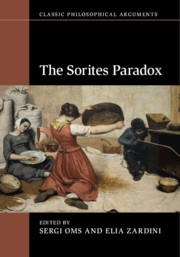Book contents
- Frontmatter
- Contents
- List of Contributors
- Acknowledgements
- Prelude
- Part I Solutions to the Sorites Paradox
- Part II The Influence of the Sorites Paradox
- 10 The Sorites Paradox in Philosophy of Logic
- 11 The Sorites Paradox in Metaphysics
- 12 The Sorites Paradox in Practical Philosophy
- 13 The Sorites Paradox in Linguistics
- 14 The Sorites Paradox in Psychology
- Coda
- References
- Index
11 - The Sorites Paradox in Metaphysics
from Part II - The Influence of the Sorites Paradox
Published online by Cambridge University Press: 20 September 2019
- Frontmatter
- Contents
- List of Contributors
- Acknowledgements
- Prelude
- Part I Solutions to the Sorites Paradox
- Part II The Influence of the Sorites Paradox
- 10 The Sorites Paradox in Philosophy of Logic
- 11 The Sorites Paradox in Metaphysics
- 12 The Sorites Paradox in Practical Philosophy
- 13 The Sorites Paradox in Linguistics
- 14 The Sorites Paradox in Psychology
- Coda
- References
- Index
Summary
Take any putative ordinary object which is divisible into a finite number of small units and tolerant to the loss of one of them. We can remove these units one at a time, and since our object definitely doesn’t exist when there are zero units, and since we cannot pinpoint which removal brings about this destruction,the Sorites Puzzle threatens common sense. We can rescue ordinary objects from its grip, but since independently motivated linguistic explanations of vagueness depend on there being multiple candidate contents of vague terms, these efforts succeed only if there are multiple candidates that can be meant by ordinary object terms. Thus, many more objects than common sense accepts have to exist. The 'arguments from vagueness' also offer soritical reasons for object proliferation. Problematising the categories composite object and persisting thing (rather than specific object concepts), these show that either there are none of these (except simples) or every candidate for making up one, does. The latter, less revisionary alternative is plenitudinism. I defend Modally Full Plenitude, because it is three-dimensionalist and non-reductivist about de re modality – a distinct persisting object in any region, and for every modal profile satisfied by the matter in that region.
Keywords
- Type
- Chapter
- Information
- The Sorites Paradox , pp. 207 - 228Publisher: Cambridge University PressPrint publication year: 2019

